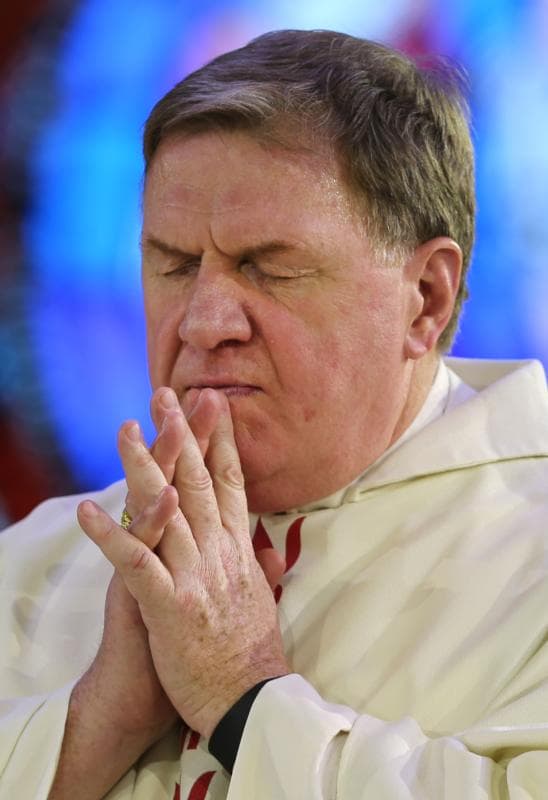WASHINGTON, D.C. — The North American Orthodox-Catholic Theological Consultation has released a new agreed statement titled “The Vocation and Mission of the People of God: ‘A Chosen Race, a Royal Priesthood, a Holy Nation.'”
The consultation is co-chaired by Cardinal Joseph W. Tobin, the Catholic archbishop of Newark, New Jersey, and Greek Orthodox Metropolitan Methodios of Boston.
The document issued Aug. 6 was finalized at the most recent meeting of the consultation, which took place in late May of this year at the St. Methodios Faith and Heritage Center in Contoocook, New Hampshire.
It says: “The members of the North American Orthodox-Catholic Consultation want first to affirm the vocation and ministry of each member of the church: a vocation and a ministry rooted in Christ’s call, first given through baptism and chrismation, and lived out through the relationships, responsibilities and obligations each of us encounters in daily life, in family, church and society.”
“More than five years in the making, this new text is an example of a different approach to ecumenical dialogue,” according to a news release from the U.S. Conference of Catholic Bishops. “Instead of addressing together an issue that has prevented full communion between the churches, here the Catholic and Orthodox theologians examine together challenges that affect both churches, in this case the role of the laity in the two traditions and the problem of clericalism.”
“In both our churches in recent decades,” says the document, “there have been continuing discussions about the proper role of the laity in worship, administration and witness.”
The Second Vatican Council in its 1963 Constitution on the Sacred Liturgy (Sacrosanctum Concilium), it says, expressed the Catholic Church’s desire “that all believers be brought to that full, conscious and active participation in liturgical celebrations which is required by the nature of the liturgy itself and to which the Christian people … have, in virtue of baptism, a right and a duty.”
“We recognize that both of our churches have often been affected by a strong emphasis on the vocation and ministry of the clergy, even to the neglect of the ministry of the laity,” it continues. “A layperson has frequently been assumed … simply to be one who is not ordained. … This perspective appears to neglect the proper, wider vocation of every Christian disciple, as that is rooted in Christ’s call and in baptism.”
The consultation’s members, it says, “have come, therefore, to recognize the need to articulate together a common perspective on the people of God and the vocation and ministry of laypersons and the ordained within it, especially in light of contemporary challenges both in the church and in society.”
It notes that from the consultation’s beginning in 1965, “lay theologians, both women and men, have been full and active participants.”
“We gratefully affirm their contributions, and believe that our North American consultation can take a distinctive part in this important discussion. It is in that spirit that we respectfully submit this statement to our churches,” it says.
The document emphasizes the sacrament of baptism is the foundation of the vocation and ministry of every Christian, clergy and laity alike, so the people of God together constitute a single community.”
Some members have received a special role of leadership within the community, it notes, but all members have received specific charisms that are to be exercised for the building up of the whole body.
The ordained clergy are set apart from the body of believers but are not above or separate from that body, the document says, which is most clearly “in the celebration of the Eucharist,” where the diversity of gifts and roles is made clear in the gathered community’s single act of praise.
“Our focus in thinking about the church, and in celebrating its reality, must be on the unity of the people of God that is grounded in our common baptism,” it says, “and on a corresponding understanding of the diversity of roles and charisms within that radically unified people.”
The document concludes: “‘There is one body and one Spirit,’ St. Paul reminds us, ‘just as you were called to the one hope that belongs to your call: one Lord, one faith, one baptism, one God and Father of all, who is above all and through all and in all. But grace was given to each of us according to the measure of Christ’s gift.’ (Eph 4.4-7) Enlivened by those particular gifts of God, may we continue to seek ways toward the unity in Christ of which Paul speaks.”
The North American Orthodox-Catholic Theological Consultation is sponsored jointly by the Assembly of Canonical Orthodox Bishops of the United States of America, the USCCB’ Committee for Ecumenical and Interreligious Affairs and the Canadian Conference of Catholic Bishops.
Since it was established, the consultation has issued some 30 agreed statements on various topics.
Like most such agreed statements, this new text does not speak officially for either church. “However, it has been drafted by a highly competent group of theologians from both traditions and submitted to all the members of both churches for their prayerful reflection and discussion,” said a USCCB news release.
Crux is dedicated to smart, wired and independent reporting on the Vatican and worldwide Catholic Church. That kind of reporting doesn’t come cheap, and we need your support. You can help Crux by giving a small amount monthly, or with a onetime gift. Please remember, Crux is a for-profit organization, so contributions are not tax-deductible.













